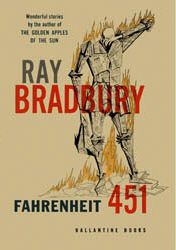Fahrenheit 451 - Ray Bradbury - Novel Description
Ray Bradbury's dystopian science fiction novel, Fahrenheit 451, was published in 1953. This is a story of future society that practices censorship, where all books are restricted, the government attempts to control what people read and think, and individuals are anti-social and hedonistic. But, this book is not only about danger of censorship, it is also about the effects of television and mass media on the reading of literature and also gives good arguments in favor of the book as the most important element of intellectual freedom. Unlike other famous dystopian novels, this book holds out some hope.
The book was written after World War II, and criticizes intellectually oppressive political climate of that period. This book also reveals a very real concern that America leaning in direction to become an oppressive, authoritarian society. The novel has been adapted to film in 1966.
The themes attributed to the novel are: censorship in 1950s, the book burning in Nazi Germany (1933), explosion of a nuclear weapon, individual vs. society, importance of literature, propaganda, paradoxes, hope, reformation of society, life and death etc.
The story takes place in an unspecified future in America, where the reading of books is abandoned. If someone is caught owning them, he is sent to a mental hospital and his books are burned, or he is condemned to immediate death. People are not interested in politics or world issues, their only entertainment now is in-ear radio and interactive form of television, and their only point of life is pleasure.
The story centres on a man named Guy Montag, who is fireman, and his job is to burn books and the houses that hold them. All firemen wear the uniforms with number "451" because it refers to the temperature in Fahrenheit at which books burn.
One day, he meets by chance the girl, Clarisse McClellan, who makes him think about the world beyond electronic entertainment and makes him wonder about his life, his ideals and his own happiness.
After that, he takes an interest in reading the books, and he steals a book that he's supposed to burn. Captain Beatty, the Fire Chief, begins to doubt Montag's devotion to his job and realizes that he has changed sides. It is soon revealed that Montag has hidden plenty of books in the house and reads them. Montag seeks Faber's help, a former English teacher he had met one time, to teach him to memorize the books so their contents can be preserved.
Beatty reveals that he knew all along of Montag's books and forces Montag to burn his house. To save himself, Montag burns and kills Beatty and escapes the city.
Then, Montag joins a group of educated, vagrant men who remember and preserved orally great novels until books are allowed and appreciated again.
As they are walking away from the city, the war begins and a nuclear bomb destroys the place that was once Montag's home. The men turn back to the completely collapsed city to help rebuild a society from scratch.
